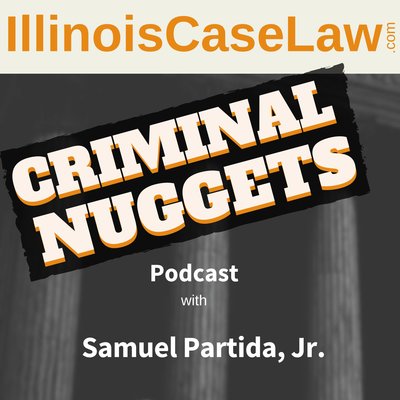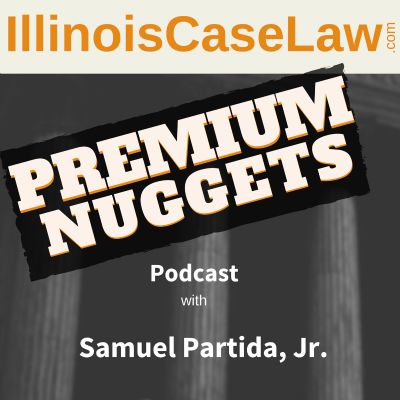Dec 22, 2014

Is it a per se conflict of interest when trial attorney raises ineffective assistance on himself? In Podcast Episode number 039 of the Criminal Nuggets we have a trial attorney who is asking for a new trial for his client because of mistakes he says he made in the first trial. Should a judge give special consideration to these motions?
The Case
Did Defendant receive ineffective assistance after a per se conflict of interest arose when his trial counsel argued his own ineffectiveness in the motion for a new trial?
This was a shooting after a party.
Defendant lost a motion to bar gang evidence because one his charges was unlawful possession of a weapon by a gang member the higher count was attempted murder.
Counsel asked the judge to be allowed to waive jury on that sole count of possession of a weapon by a gang member so that the State could not admit the evidence of gang membership. Judge denied this request.
The jury was then read all four counts including the gang count. Jury was also asked if they could give Defendant a fair trial even though they would hear evidence of gang membership.
But then...
After the jury was picked. Defendant plead guilty to the unlawful possession of a weapon by a felon count. The jury never heard any gang evidence.
At this point, defense counsel moved to have the venire dismissed. Counsel argued that informing the jurors of alleged gang membership tainted them. The trial judge denied this request.
The trial judge then reread to the jury the charges defendant faced, now only attempted first degree murder and aggravated battery with a firearm. The court informed the jury it would no longer hear evidence of any alleged gang membership.
“Each juror indicated he or she could be fair and impartial.” ¶ 72.
The Defense
Defendant claimed self defense.
The victim left a party. Outside he began to argue with passengers in a dark SUV. Punches were thrown through the window by the victim and returned by the the passengers in the car. Nobody ever got out.
Defendant was in a back seat. Defendant drew a gun and shot victim. The bullet struck the victim’s right forearm and then entered the right side of his chest, piercing the right lung.
He survived.
“The jury acquitted Short of attempted first degree murder, finding him guilty only of aggravated battery with a firearm.” ¶ 58
Post Trial Motion
In his post trial motion, defense counsel that he errored by allowing the court to inquiry into the veneer's possible prejudice if they heard gang membership evidence.
This allowed the jury to be prejudiced because it was told during voir dire that Defendant was an alleged gang member and that he had been charged with charges he had pled guilty to. Thus, the bell "could not be unrung" and the jurors would likely speculate as to why those charges were removed from their consideration.
Clear Legal Principles
First of all, defendant is not entitled to bench trial on certain charges and jury trial on others. See People v. Arndt, 50 Ill. 2d 390, 395 (1972).
When trial counsel makes the motion, there is no per se finding of ineffective assistance of counsel for himself.
Per Se Conflicts
Additionally, there are per se conflicts of interest that may lead to ineffective assistance of counsel. See People v. Taylor, 237 Ill. 2d 356, 374 (2010). Once a per se conflict is found, there is no need to show that the conflict affected the attorney's actual performance. Id. at 374-75.
The Illinois Supreme Court has identified three situations where a per se conflict exists:
(1) Where defense counsel has a prior or contemporaneous association with the victim, the prosecution, or an entity assisting the prosecution
(2) Where defense counsel contemporaneously represents a prosecution witness; and
(3) Where defense counsel was a former prosecutor who had been personally involved in the prosecution of defendant.
See Id. at 374. See also People v. Steele, 2014 IL App (1st) 121452 (09/30/2014).
Is It A Per Se Conflict of Interest When Trial Attorney Raises Ineffective Assistance on Himself ?
Notably missing from this list is a claim of ineffectiveness from the same attorney who was allegedly ineffective. See People v. Perkins, 408 Ill. App. 3d 752, 761 (2011) (attorney alleging his own ineffectiveness doe not fall within any of the identified per se conflict categories).
To show that there is an actual conflict of interest, the defendant must offer "some specific defect in his counsel's strategy, tactics, or decision making attributable to the conflict." People v. Spreitzer, 123 Ill. 2d 1, 18 (1988).
The Strickland Standard
Claims of ineffective assistance of counsel are analyzed under the standard set forth in Strickland v. Washington, 466 U.S. 668 (1984). People v. Albanese, 104 Ill. 2d 504, 525 (1984).
Under Strickland, a defendant must show that -
(1) Counsel's performance was
deficient and that
(2)He or she was prejudiced because of it.
See Strickland, 466 U.S. at 687.
To show deficient representation, a defendant must establish that counsel's performance fell below an objective standard of reasonableness. People v. Edwards, 195 Ill. 2d 142, 163 (2001). To establish prejudice, the defendant must show there is a reasonable probability that, but for counsel's deficient representation, the result of the proceeding would have been different. "A reasonable probability is a probability sufficient to undermine confidence in the outcome." Strickland, 466 U.S. at 694. ¶ 92.
The right to effective assistance of counsel refers to competent, rather than perfect, representation. People v. Palmer, 162 Ill. 2d 465, 476 (1994). “Strickland requires only that a defendant receive a fair trial—a trial free of errors so egregious that they probably caused the conviction. People v. Griffin, 178 Ill. 2d 65, 91 (1997).” ¶ 93.
What Happened In This Case?
Remember, trial counsel included an ineffective assistance claim in the post trial motion. He claimed either a per se or actual conflict.
His allegation is that he did not clearly inform the court of Defendant’s intent to plead guilty of the bench trial was denied. This error lead to the jury being informed about Defendant’s alleged gang status.
On appeal Defendant contends the trial court misunderstood the nature of his counsel's pretrial motion. He argues counsel was requesting a bench trial or that he be allowed to plead guilty to the gang charge before voir dire to prevent the jury from being informed of the two charges and alleged gang membership.
Defendant alleged his trial counsel was ineffective for failing to clarify the nature of his pretrial motion and seek a full ruling on his alternative request to plead guilty before voir dire. This so prejudiced him by allowing the potential jurors to hear about his alleged gang membership.
The reviewing court did not find that any misunderstanding occurred.
Defendant only asked to waive jury on some of the counts; he did not say he was prepared to plead guilty.
Defendant acknowledges he plead guilty in the middle of the proceedings to prevent the potential jurors from hearing about his alleged gang membership.
The court said counsel's’ trial strategy left him in this position, where the jury first heard the gang membership issue and then heard that it was not an issue after all.
In any event, there is no evidence that the jury was prejudiced in this case because they said they wouldn’t be and they acquitted him of the first degree murder.
It does not matter that trial counsel was the first to raise a claim of ineffectiveness on himself. There was no merit to counsel’s claim of ineffectiveness.
This Has To be the Rule
We would have a mess on our hands if the court gave special treatment to claims of ineffectiveness brought by trial attorneys themselves.
At first, it seems these kinds of allegations should be given some kind of special weight. After all the trial attorney is going to know best whether he or she made a significant error in the case.
What is the wisdom in appointing separate counsel to get to the bottom of another trial attorney's error?
The problem, is that this kind of a rule would essentially be given the defense a second bite at the trial or litigation apple. It would be to easy for the defense to raise error on themselves after a particular trial strategy does not lead the results they expected.
This system would be ripe for abuse.
Less scrupulous defense attorneys would simply plan on a post trial motion to undue unrealistic or reckless trial positions.
But even honest trial attorneys would be tempted to second guess their original positions when the outcomes are not what they expected.



